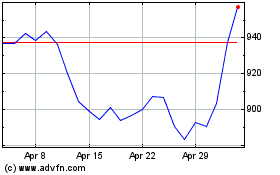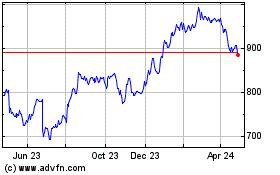By Joseph Walker
Regeneron Pharmaceuticals Inc. said its antibody drug reduced
the risk of Covid-19 hospitalization or death by about 70% in a
large clinical trial, the most definitive evidence yet that the
medicine can aid recovery early in the course of disease.
Among subjects in a late-stage trial receiving a lower dose of
the antibody drug, 1% were hospitalized or died, compared with 3.2%
of patients receiving placebos, Regeneron said Tuesday. Study
subjects getting a higher dose had a similar risk reduction, the
company said.
Regeneron said it would seek FDA authorization for the lower
dose after it proved similarly effective to the higher dose
currently available. The change would effectively double
manufacturing capacity of the medicine going forward.
Regeneron issued the high-level results in a press release. The
data haven't yet been published in detail or in a peer-reviewed
journal.
Regeneron's drug is among a handful of therapies authorized for
Covid-19 patients to prevent severe disease and hospitalization.
The drugs are targeted at patients early in the disease, when the
virus is thought to be most susceptible to treatment.
The therapies have been scantily used, however, because of what
doctors say is a cumbersome process for administering them and a
lack of robust clinical trial data proving their effectiveness.
The new study data released by Regeneron on Tuesday could help
boost enthusiasm for the medication among doctors and hospitals.
The data could also eventually prompt influential expert panels
convened by the National Institutes of Health and the Infectious
Diseases Society of America to issue treatment guidelines
recommending the drug's use.
Regeneron will likely have to release more detailed data, such
as the baseline conditions of patients and a full breakdown of
deaths and hospitalizations across study groups, before the drug
receives stronger backing form medical groups, said Adarsh Bhimraj,
a Cleveland Clinic physician who serves on the IDSA's guidelines
committee.
"It looks promising but we still need to see the full data,"
said Dr. Bhimraj. He said monoclonal antibody drugs like
Regeneron's so far look to be modestly effective because they
require that a large number of patients be treated to show a
significant reduction in bad outcomes from Covid-19.
"There's been no huge game-changers for Covid-19, so if I'm able
to use it in 100,000 people to keep a couple hundred people out of
the hospital there's some value in it," he said.
In November, the U.S. Food and Drug Administration cleared
Regeneron's drug and another antibody treatment made by Eli Lilly
& Co. for treating people with mild or moderate symptoms of
Covid-19 who are at high risk of developing severe cases because of
risk factors such as their age or underlying health conditions.
Both medicines are monoclonal antibodies, lab-engineered
molecules that mimic the natural antibodies produced by the immune
system to fight off viruses.
In October, former President Donald Trump received Regeneron's
drug after he was infected with Covid-19 and later credited the
medicine with his speedy recovery.
The initial authorizations in November were based on preliminary
data from smaller earlier-stage studies. In recent weeks, the
companies have issued findings from much larger studies that
confirm the benefits seen in the earlier analyses.
The latest data comes from a Phase 3 study that compared two
doses of Regeneron's drug, named REGEN-COV, with placebos in more
than 4,000 Covid-19 patients with at least one risk factor such as
obesity or cardiovascular disease.
The lower dose reduced the risk of hospitalization or death in
study subjects by 70%, Regeneron said.
In the higher dose group, 1.3% of patients taking the drug were
hospitalized or died, compared with 4.6% of those who received
placebos, a 71% reduction of risk.
There was one patient death in each of the Regeneron drug study
groups, and five deaths across both of the placebo groups.
"We are committed to working with the government, healthcare
providers and others to support rapid and widespread adoption of
REGEN-COV in appropriate patients," said George D. Yancopoulos,
Regeneron president and chief scientific officer.
Regeneron's data suggest the drug's effectiveness is similar to
Eli Lilly's drug cocktail, which combines a new monoclonal
antibody, named etesevimab, to one called bamlanivimab that was
authorized last year. The FDA authorized the cocktail in February
based on trial data showing it reduced hospitalizations or death by
70%.
Regeneron also said Tuesday that the FDA recently updated a fact
sheet on the drug to show that in laboratory tests it is no less
effective against new coronavirus variants that were first
identified in the U.K., South Africa and elsewhere.
By contrast, the FDA's most recently updated fact sheet for Eli
Lilly's cocktail drug says it appears to be less potent against
certain variants including those from South Africa and Brazil in
laboratory tests. It is unclear whether the lab test findings will
carry over to the drug being less effective in human patients, the
FDA fact sheet says.
"There's a huge difference between what happens in a petri dish
and what happens in a patient," said Dr. Bhimraj. An Eli Lilly
spokeswoman didn't respond to a request for comment.
In addition, Regeneron said it had tested a new formulation of
its drug that can be given as a quick shot, rather than via the
intravenous infusions that are required now.
In a Phase 2 study, the new formulation reduced patients' virus
levels as measured in samples taken from nasal swabs, but further
studies may be required to show that it reduces the risk of
hospitalization and death, a Regeneron spokeswoman said.
Write to Joseph Walker at joseph.walker@wsj.com
(END) Dow Jones Newswires
March 23, 2021 02:14 ET (06:14 GMT)
Copyright (c) 2021 Dow Jones & Company, Inc.
Regeneron Pharmaceuticals (NASDAQ:REGN)
Historical Stock Chart
From Mar 2024 to Apr 2024

Regeneron Pharmaceuticals (NASDAQ:REGN)
Historical Stock Chart
From Apr 2023 to Apr 2024
